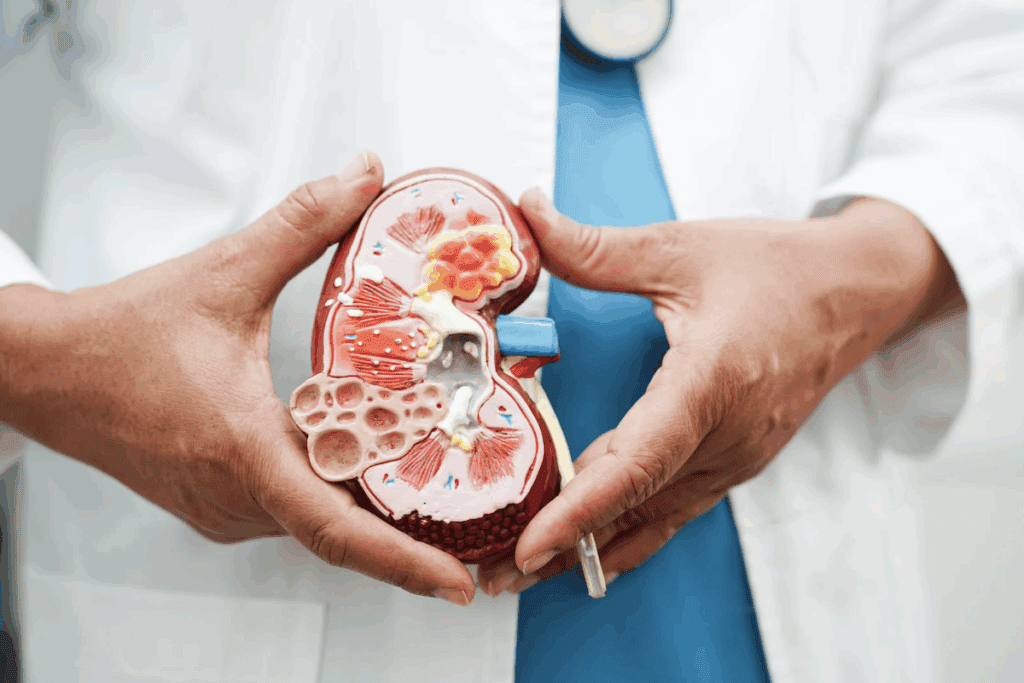Last Updated on October 31, 2025 by Bilal Hasdemir

Are you looking for natural ways to fight kidney stones? At Liv Hospital, our team is all about caring for our patients. We’re excited to tell you about the benefits of apple cider vinegar (ACV) for kidney stones.
ACV might help because it has acetic acid. This acid could soften and break down stones, making them pass more easily. A 2019 study from China showed that drinking vinegar regularly could lower the risk of acv for kidney stones by up to 40%. We’ll look into how ACV could stop stones from forming and ease symptoms.

Kidney stones are a common health problem. They affect many people at some point. These stones can cause a lot of pain and discomfort.
Kidney stones are hard deposits made of minerals and salts. They form inside the kidneys. These stones can be small or very large, like a golf ball.
Many things can make these stones form. Dehydration, diet, and genetics are some of them.
There are several types of kidney stones. Each type has its own cause. Here are the most common ones:
| Type of Stone | Cause | Prevalence |
| Calcium Oxalate Stones | Excess calcium or oxalate in the urine | Most common, about 80% |
| Uric Acid Stones | Excess uric acid in the urine, often due to diet or certain medications | About 10% |
| Cystine Stones | Genetic disorder causing cystine to leak into the urine | Rare, about 1% |
Some things can make you more likely to get kidney stones. Family history, dehydration, diet, and obesity are some of them. Symptoms include severe pain in the side or back.
Pain can also spread to the lower abdomen or groin. Other urinary symptoms can also occur.
The National Kidney Foundation says about 1 in 10 people will get kidney stones. This shows how important it is to know about them to prevent and manage them well.

Apple cider vinegar (ACV) might help our kidneys, research shows. It’s important to know how ACV works in our bodies. This includes its makeup and how it affects us.
ACV mainly has acetic acid, made when apple cider ferments. This acid is key to ACV’s health perks. It also has water, malic acid, and minerals.
The mix in ACV might help our kidneys. Acetic acid is studied for its role in preventing kidney stones. It affects how our urine handles citrate and calcium.
Acetic acid in ACV might stop kidney stones from forming. It boosts citrate in urine and cuts down calcium. Citrate stops calcium oxalate stones, the most common type.
A study in a medical journal linked ACV to fewer kidney stones. This backs up ACV’s role in preventing stones.
Research on ACV and kidneys is ongoing. A 2019 study showed ACV lowers kidney stone risk. This is good news for kidney health.
| Study | Findings | Relevance to Kidney Health |
| 2019 Study on Dietary Vinegar | Associated with lower risk of kidney stones | Potential preventive measure for kidney stone formation |
| Research on Acetic Acid | Increases urinary citrate, lowers calcium excretion | May inhibit formation of calcium oxalate stones |
More research is needed on ACV and kidneys. But, its acetic acid is key to its benefits. It affects kidney function and stone formation.
Drinking a diluted ACV mixture daily might help lower the risk of kidney stones. You mix apple cider vinegar with water to make a drink. This can be part of your regular routine.
To make the ACV and water mixture, use 1-2 tablespoons of ACV in 6-8 oz of water. This ratio helps avoid side effects while keeping the benefits of ACV.
Drink the ACV mixture once daily for prevention. The morning is a good time. It can kickstart digestion for the day.
Research on ACV’s effects on kidney stones is ongoing. Some studies show that ACV’s acetic acid may reduce stone formation. It does this by making urine pH and citrate levels higher. This can prevent some types of kidney stones.
Even though more research is needed, adding a daily ACV and water mixture to your routine could be helpful. It’s a good part of a prevention plan.
Mixing apple cider vinegar (ACV) with lemon juice and olive oil makes a strong remedy against kidney stones. This mix uses the good stuff from each to help your kidneys stay healthy.
To make this remedy, combine 2 tablespoons of ACV, 1 tablespoon of fresh lemon juice, and 1 tablespoon of olive oil. Mix it well before drinking.
Drink this mix once a day, best in the morning when your stomach is empty. But, if your stomach is sensitive, have it after eating to avoid discomfort.
The ACV, lemon juice, and olive oil mix works in several ways to stop kidney stones. The lemon juice’s citrate is key because it stops calcium oxalate stones from forming.
Citrate’s Role: Citrate links with calcium in your urine, making less free calcium to form stones. This greatly lowers the chance of stone formation.
Many studies show citrate’s role in stopping calcium oxalate stones. A review of trials found that citrate can cut down stone return by a lot.
| Study | Participants | Outcome |
| Journal of Urology, 2018 | 120 patients | 50% reduction in stone recurrence |
| European Urology, 2020 | 200 patients | 40% decrease in stone formation |
Even though these studies were on citrate supplements, the natural citrate in lemon juice does the trick when mixed with ACV and olive oil.
ACV is known for its ability to ease kidney stone pain. It has anti-inflammatory properties. For centuries, people have used ACV to treat various ailments, including kidney stone pain.
The anti-inflammatory effects of ACV come from its acetic acid. Acetic acid has been shown to have anti-inflammatory effects, which may help in reducing the pain associated with kidney stones. A study in the Journal of Food Science found that “acetic acid can potentially reduce inflammation and alleviate pain.”
“The anti-inflammatory properties of ACV make it a natural remedy for pain relief.”
Medical Expert, Journal of Food Science
For acute kidney stone pain, use 1-2 tablespoons of ACV diluted in water. Start with a small dose to see how you react. Always dilute ACV with water, as undiluted ACV can be harsh on the digestive system.
ACV may help with kidney stone pain, but it has its limits. It should not replace medical treatment but can be used alongside it. Severe pain or persistent symptoms require immediate medical attention. Results can vary, and what works for one person may not work for another.
The ACV kidney cleanse is a natural way to help your kidneys. It might even stop stones from forming. People say apple cider vinegar cleanses the kidneys, but science isn’t fully behind it.
To do the ACV kidney cleanse, just follow these steps:
The ACV cleanse lasts 7-14 days. Some say do it monthly. But, always talk to a doctor before starting.
The idea of detoxing kidneys is debated. ACV might help kidneys, but the liver and kidneys detox naturally. More research is needed on ACV and kidneys.
| Cleanse Component | Role | Scientific Evidence |
| Apple Cider Vinegar | Potential alkalizing effect, may help dissolve mineral deposits | Limited studies on ACV and kidney stone prevention |
| Hydration | Essential for kidney function and stone prevention | Strong evidence supporting hydration for kidney health |
While the ACV kidney cleanse might help, see it as a supplement, not a cure. Always check with a doctor before trying new health plans.
Apple cider vinegar (ACV) mixed with honey and baking soda might help with kidney stones. This mix could make ACV work better to prevent stones.
To make this mix, you need 2 tablespoons of ACV, 1 tablespoon of honey, and 1/2 teaspoon of baking soda. Mix them in 8 ounces of warm water until everything dissolves.
Preparation Steps:
The mix of ACV, honey, and baking soda might help dissolve stones. ACV’s acid can break down stones. Baking soda can make urine less acidic, which might stop stones from forming.
Baking soda makes the body less acidic. Studies show that alkalizing urine can lower the chance of some kidney stones, like uric acid stones.
| Ingredient | Potential Benefit |
| Apple Cider Vinegar (ACV) | May help dissolve kidney stones |
| Honey | Soothes the urinary tract |
| Baking Soda | Alkalizes urine, reducing stone risk |
Knowing how these ingredients work together helps people decide if this remedy is right for them.
Using a warm ACV compress on the skin is a natural way to ease kidney stone pain. It uses ACV’s anti-inflammatory properties to help with relief.
To make an ACV compress, you need:
Mix warm water and ACV in a bowl. Soak a cloth in it, then squeeze out excess liquid. This makes the compress work best.
To use the compress:
The warmth and ACV may relax muscles and cut down inflammation. This could help ease kidney stone pain.
The ACV compress might help with kidney stone pain because of acetic acid. Acetic acid has anti-inflammatory effects. This could lessen kidney stone discomfort when applied to the skin.
Though more research is needed, using ACV in a warm compress is a simple, safe way. It might help with kidney stone pain alongside other treatments.
Using Apple Cider Vinegar (ACV) in your diet might help prevent kidney stones. It’s key to know how to add ACV to your meals and what foods go well with it.
Adding ACV to your diet is easy and fun. Try it as a salad dressing or mix it with olive oil for a tasty vinaigrette. You can also add a tablespoon of ACV to water for a refreshing drink. Some people use it in marinades or in soups and stews.
“ACV in cooking adds flavor and health benefits,” says a top nutrition expert. “It’s a simple way to fight kidney stones every day.”
ACV is great, but eating other foods helps too. These include:
Eating these foods with ACV can boost your kidney health. For example, a salad with greens, citrus, and ACV dressing is tasty and good for you.
Studies show that vinegar can lower the risk of kidney stones coming back. A study found that those who drank vinegar daily had fewer stones than those who didn’t.
ACV might prevent stones by changing urine pH and citrate levels. Adding ACV to your diet could help avoid kidney stones.
In summary, adding ACV to your meals is a smart way to prevent kidney stones. Knowing how to use ACV and pairing it with other healthy foods can help keep your kidneys healthy.
To get the most from ACV for kidney stones, knowing its safety is key. ACV is usually safe but can cause issues if taken too much or by those with health problems.
Not all ACV is the same. We suggest picking raw, unfiltered ACV with the “mother” at the bottom. This cloudy stuff means it’s full of good bacteria and proteins. It’s stronger and might be more helpful than filtered kinds.
Too much ACV can upset your stomach and lower potassium levels. Stick to 1-2 tablespoons (15-30 ml) in a big glass of water each day. Start small to see how you react.
Safe drinking tips:
Some people should be careful or not use ACV at all. This includes those with acid reflux or stomach ulcers, as it can make things worse. People with diabetes need to keep an eye on their blood sugar, as ACV can affect it.
Those with kidney disease should talk to their doctor before using ACV. It might interact with their meds or harm their kidneys.
We’ve looked into how apple cider vinegar (ACV) helps prevent and manage kidney stones. Knowing what’s in ACV and how it affects kidneys helps people decide if it’s right for them.
ACV might help prevent kidney stones and ease symptoms. But it’s not a cure-all. It’s best used as part of a bigger plan to stay healthy. We talked about different ways to use ACV, like mixing it with water or adding it to food.
Using ACV with other natural remedies and eating well can lower your risk of getting kidney stones again. Always talk to a doctor before trying new health treatments, even if they seem natural.
Apple cider vinegar may help prevent kidney stones. It can reduce the formation of certain types of stones. It also helps alleviate symptoms.
The acetic acid in apple cider vinegar may dissolve small stones. It also reduces the risk of new stones by changing urine pH and improving kidney function.
Yes, apple cider vinegar has anti-inflammatory properties. It may help ease pain from kidney stones. But, it should not replace medical treatment for severe pain.
Mix 1-2 tablespoons of apple cider vinegar with 8 ounces of water. Drink it daily, or as advised by a healthcare professional.
Raw, unfiltered apple cider vinegar with the “mother” is best. It’s recommended for its health benefits, including kidney health.
No, there’s no evidence that apple cider vinegar causes kidney stones. In fact, it may prevent certain types of stones.
Side effects include digestive issues and tooth erosion. It may also interact with some medications. So, consume it in moderation and consult a healthcare professional.
Apple cider vinegar may interact with some medications or treatments. Always consult a healthcare professional before using it as a complementary therapy.
No, apple cider vinegar should not replace medical treatment. It may be used as a complementary therapy under a healthcare professional’s guidance.
Some research suggests apple cider vinegar may dissolve small stones. But, its effectiveness for larger stones is unclear. Medical treatment may be necessary.
Benefits may vary based on individual factors. These include the type and size of stones, overall health, and how often you consume apple cider vinegar.
Yes, adding apple cider vinegar to your diet through cooking can be helpful. It’s a good addition to a kidney stone prevention plan.
Yes, people with certain health conditions should consult a healthcare professional before consuming apple cider vinegar. It may worsen conditions like digestive issues or diabetes.
Subscribe to our e-newsletter to stay informed about the latest innovations in the world of health and exclusive offers!
WhatsApp us